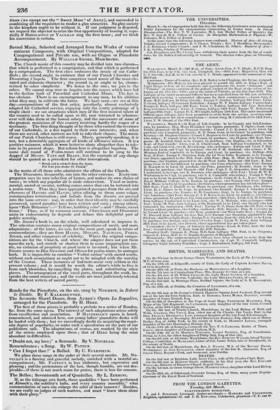Sacred Music, Selected and Arranged from the Works of various
eminent Composers, with Original Compositions, adapted for Congregational and Private use, with an Organ or Pianoforte Accompaniment. By WILLIAM SHORE, Manchester.
The Church music of this country may be divided into two classes—. that which is performed to a congregation, and that which is performed by a congregation. The first class embraces the music of our Cathe- drals; the second ought to embrace that of our Parish Churches and Dissenting Chapels. The first Comprises vocal music of the most ele- vated and elaborate character ; the second is, or ought to be, charac- terized by sober simplicity. We listen to the one ; we join in the other. We cannot stop now to inquire into the causes which have led to the decline both of Parochial and Cathedral Music. The Let is too obvious. There is no encouragement to any man, be his abilities what they may, to cultivate the latter. We have seen—we see at this day—compositions of the first order, peculiarly, almost exclusively adapted for Cathedral service, enjoying only the scanty patronage of a 'single choir : we see situations which men of the first musical talent of the country used to be called upon to fill, now intrusted to whomso- ever will take them at the lowest salary, and the successors of some of the greatest musicians of this country receiving hardly the wages of a mechanic. The first thing thought of by those who control the revenues of our Cathedrals, is a due regard to their own interests; and, when these are served, other matters are left to take their chance. The music of our Parish Churches is still worse. Music, generally speaking, it is not, but a detestable aggregate of all kinds of offensive noises. It is a positive nuisance, which it were better to abate altogether than to tole- rate in its present shape. But reform here is altogether hopeless. The same dull round of Psalm-tunes will continue to be sung to the doggrel of Messrs. TATE and BRADY, lest the example of any change should be quoted as a precedent for other innovations.
" Brush not a cobweb from the dome, For fear you shake St. Pours,"
is the motto of all those who administer the affairs of the Church.
The Dissenters, frequently, run into the other extreme. Every con- gregation uses its own selection of hymns, and makes its own choice of tunes ; to which any popular air is made subservient. Vocal or instru- mental, sacred or secular, nothing comes amiss that can be tortured into a psalm-tune. Thus they have appropriated passages from the airs and :choruses of HANDEL and HAvoN, often affixing to them sonic vulgar, commonplace termination ; and ballads from the theatre are pressed into the same service : nay, in order that their identity may be carefully preserved, sacred parodies have been written and sung ; among others, upon "Rule Britannia"—" Tell me, babbling echo'—and" Home, sweet -home." Thus, as if by common consent, Churchmen and Dissenters unite in endeavouring to degrade and debase this delightful part of public worship. • Mr. Snonli's book is, on the whole, well calculated to improve it. The selection contains many original compositions of merit, and more adaptations : of the latter, we can, for the most part,.speak in terms of commendation—they are from HAYDN, MOZART, NAUMANN, PEREZ, Srona, and other composers of celebrity. Where the original compo- sitions are for the Church, and where the adapter does not put them Upon the rack, and stretch or shorten them to some inappropriate me- tre, no violation of propriety or good taste is incurred ; but when Mr. SHORE resorts to Don Giovanni and Oberon for psalm-tunes, he outrages both. It is impossible to combine " Vedrai carino" with sacred words, without such associations as ought not to be mingled with the worship of the Creator. These instances of bad taste occur very seldom in the present volume ; and it would be worth the editor's while to free it from such blemishes, by cancelling the plates, and substituting other pieces. The arrangement of the vocal parts, throughout the work, be- speaks the sound musician ; and the words are most judiciously selected from the best writers of sacred poetry.


























 Previous page
Previous page